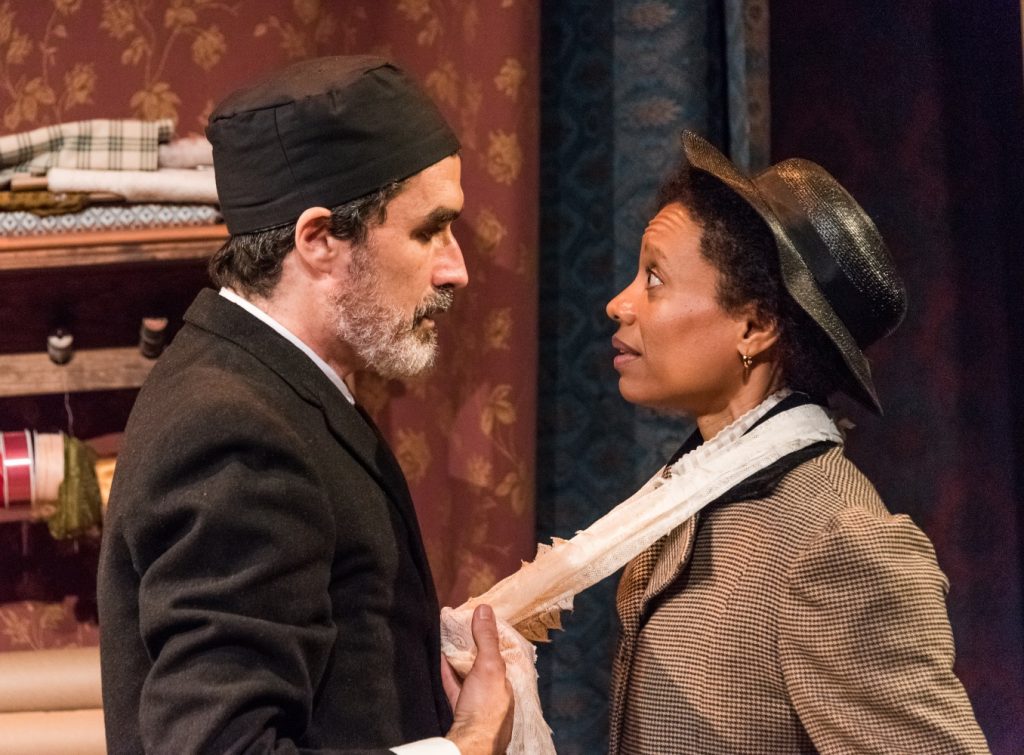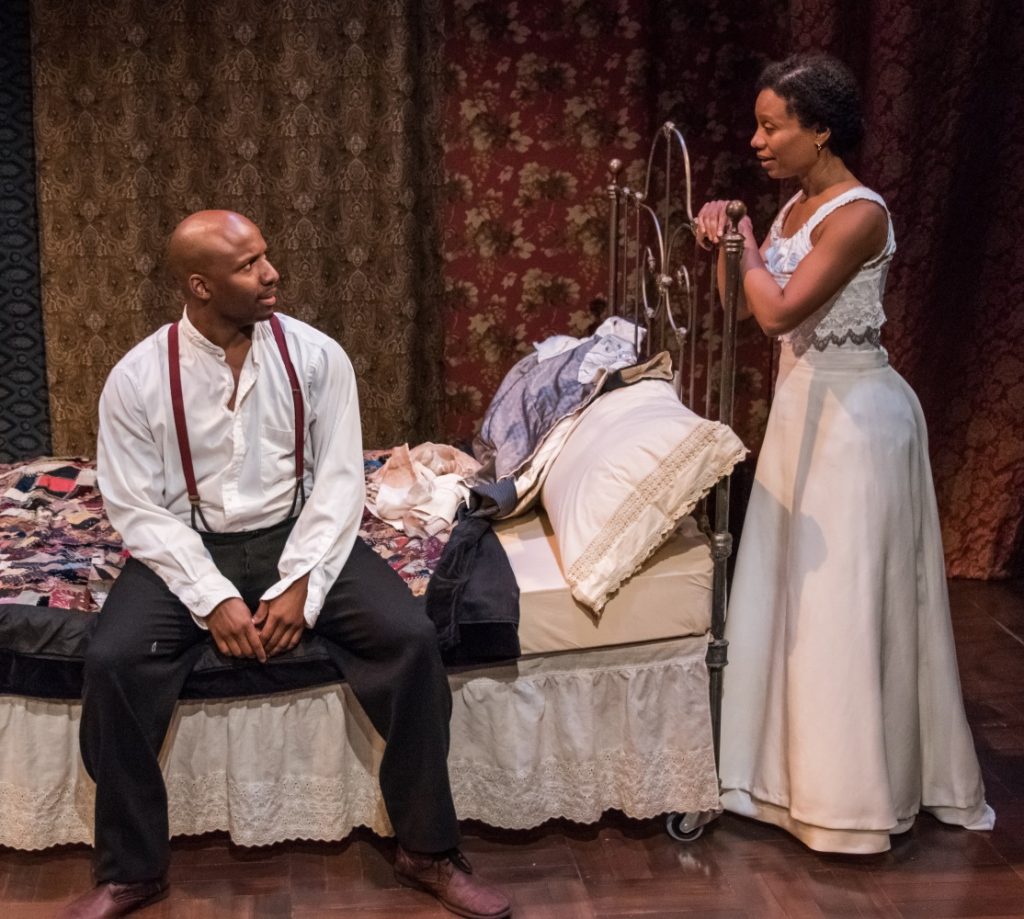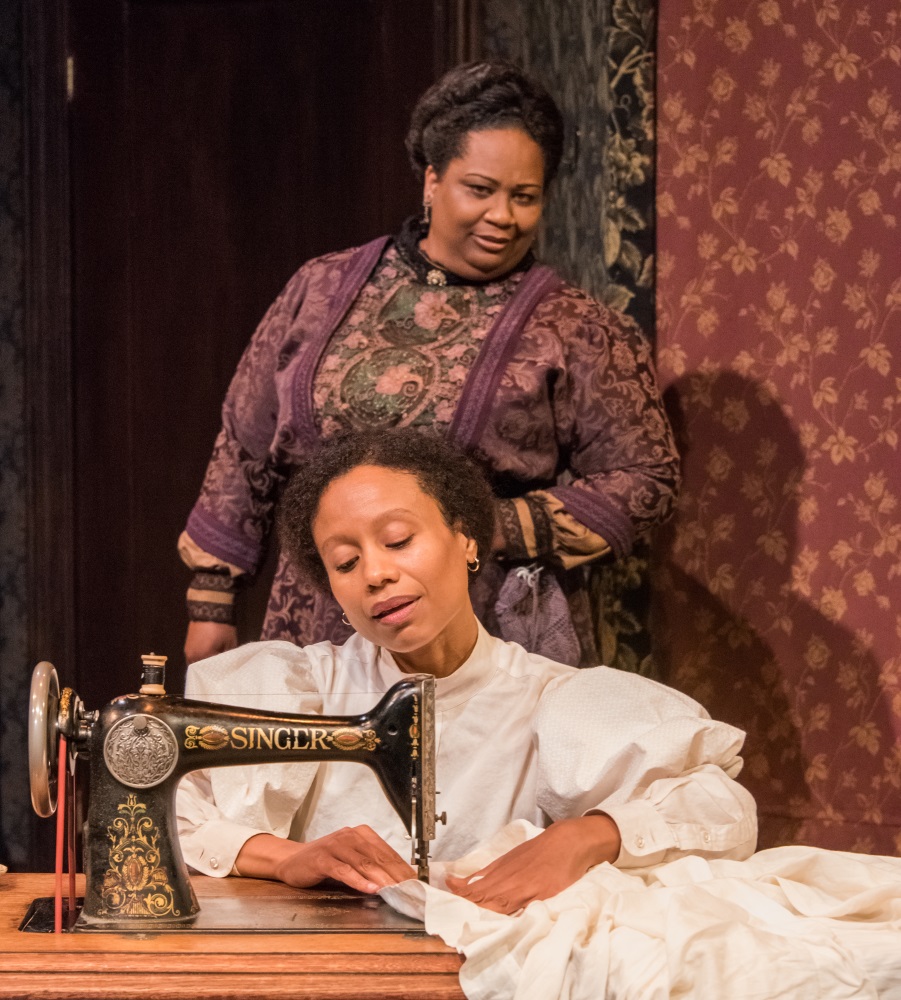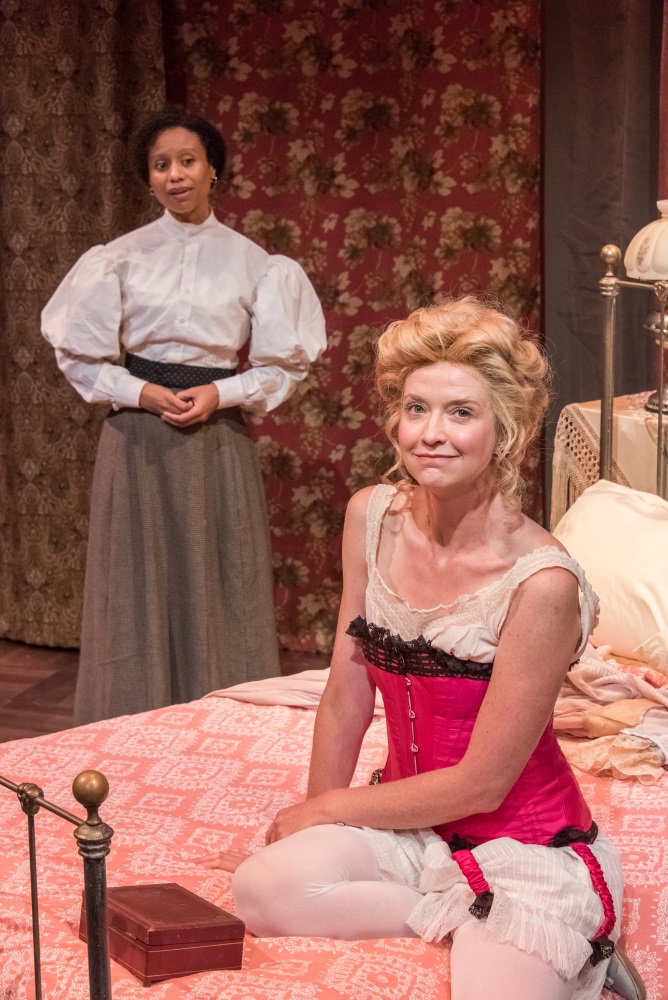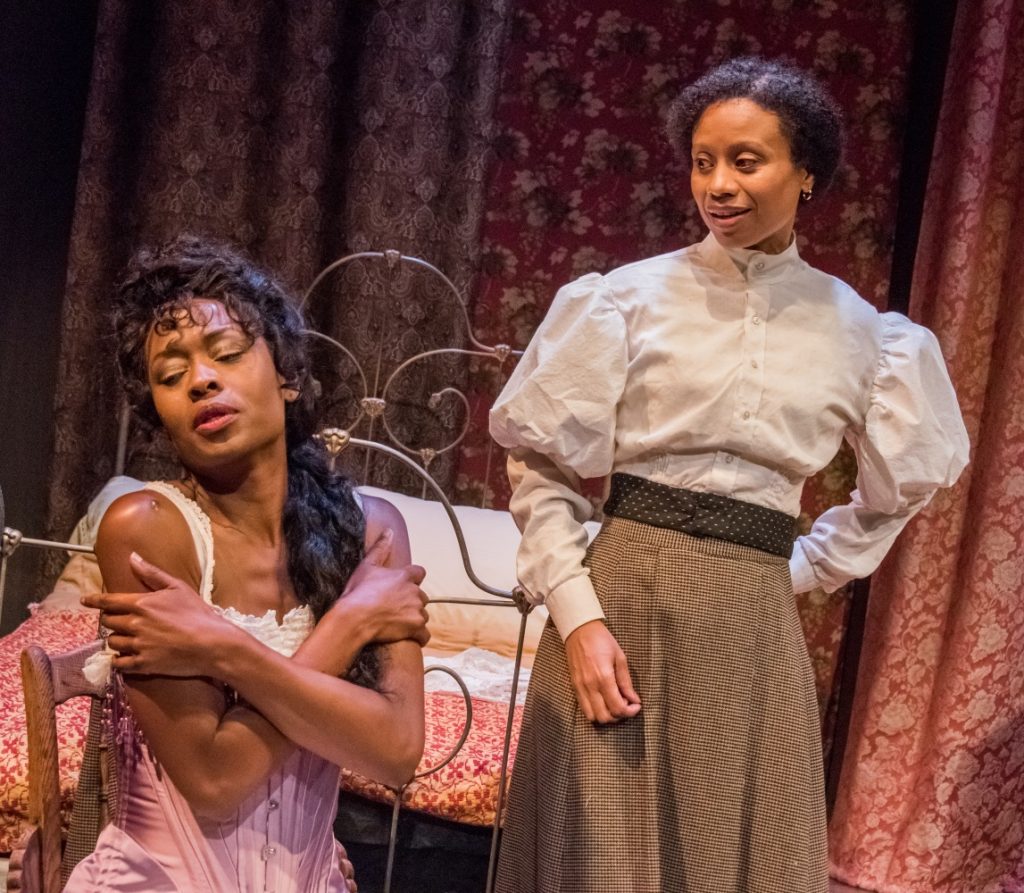Intimate Apparel is all about fabrics. The silky fabrics draping the figures of elegant Gilded Age matrons and the coarser fabrics worn by their servants, delineating both economic and social standing. The deceptively comfortable fabrics covering the women’s corsets, whose plain or fancy decorations likewise convey status but whose whalebone stays and torturous lacing mean confinement for women of all stations. And then, those metaphorical fabrics of community, family life and personal relationships – the connective threads that denote belonging, but can fray and tear.
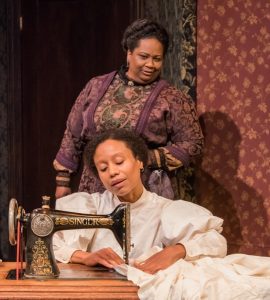 At the center of Lynn Nottage’s penetrating drama, playing on Shakespeare & Company‘s Lenox campus through August 13, is Esther, a 35-year-old “spinster,” which in this context can be taken in two senses. She’s unmarried, and she earns her living by, well, not spinning but sewing. She fashions bespoke gowns and corsets for clientele ranging from society ladies to ladies of the night. Those women span not only the class divisions of 1905 New York, where the play is set, but the country’s racial divides. Esther is African-American, and her best customer is the rich white socialite Mrs. Van Buren.
At the center of Lynn Nottage’s penetrating drama, playing on Shakespeare & Company‘s Lenox campus through August 13, is Esther, a 35-year-old “spinster,” which in this context can be taken in two senses. She’s unmarried, and she earns her living by, well, not spinning but sewing. She fashions bespoke gowns and corsets for clientele ranging from society ladies to ladies of the night. Those women span not only the class divisions of 1905 New York, where the play is set, but the country’s racial divides. Esther is African-American, and her best customer is the rich white socialite Mrs. Van Buren.
Intimate Apparel was inspired by the playwright’s great-grandmother, a seamstress who, like Esther, created finely wrought undergarments for highbrow and lowborn alike. The play is also a sad love story that crosses lines of race and class, involving Esther’s romantic correspondence with a Barbadian laborer and a tentative friendship with a Jewish fabric merchant. Strains of ragtime piano between the scenes recall the era and underscore the show’s playful but melancholic tone.
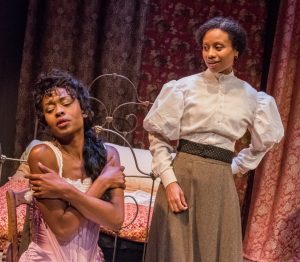 Most of the scenes take place in bedrooms – another sense of the title’s “intimate.” On the narrow stage of the company’s Bernstein Theatre, one brass bedstead serves multiple locations, acting as, yes, a kind of fabric connecting the contradictory milieus, among them the respectable rooming house where Esther resides, the Van Burens’ opulent townhouse, and a whorehouse. Those varied chambers are backed on Sandra Goldmark’s set by a composite curtain made of what look like ornamental bedspreads.
Most of the scenes take place in bedrooms – another sense of the title’s “intimate.” On the narrow stage of the company’s Bernstein Theatre, one brass bedstead serves multiple locations, acting as, yes, a kind of fabric connecting the contradictory milieus, among them the respectable rooming house where Esther resides, the Van Burens’ opulent townhouse, and a whorehouse. Those varied chambers are backed on Sandra Goldmark’s set by a composite curtain made of what look like ornamental bedspreads.
Daniela Varon’s searching, sensitive production is lifted by some compelling performances. Nehassaiu deGannes makes a most welcome return after her three-character tour de force in last summer’s Or, giving Esther a wide-eyed innocence coupled with working-class practicality and a steely core of principle. (She also tests our suspension of disbelief whenever her character is described as “plain,” since the actress herself is anything but.)
 Christiannna Nelson also returns, in a role diametrical to the battered and bitter combat veteran in last summer’s Ugly Lies the Bone. Here she’s stylish Mrs. Van Buren, easing the boredom of her plush but empty life with costly undergarments and expensive cognac. MaConnia Chesser is effective as Esther’s landlady, a rather stock character, the kind of no-nonsense black woman whose go-to phrase, if she lived today, would be “Oh, hey-ull no!” As Mayme, the hard-shelled prostitute who is one of Esther’s customers and her only confidante, Medina Senghore is fetching and feisty, funny and poignant in one of the play’s most engaging and complex roles.
Christiannna Nelson also returns, in a role diametrical to the battered and bitter combat veteran in last summer’s Ugly Lies the Bone. Here she’s stylish Mrs. Van Buren, easing the boredom of her plush but empty life with costly undergarments and expensive cognac. MaConnia Chesser is effective as Esther’s landlady, a rather stock character, the kind of no-nonsense black woman whose go-to phrase, if she lived today, would be “Oh, hey-ull no!” As Mayme, the hard-shelled prostitute who is one of Esther’s customers and her only confidante, Medina Senghore is fetching and feisty, funny and poignant in one of the play’s most engaging and complex roles.
The cast’s two men represent opposite poles in Esther’s life. There’s big, burly George, who conducts a courteous pen-pal courtship that shifts and darkens once it’s consummated, embodied in a chameleon performance by Lee Edward Colston II. Tommy Schrider is the achingly well-mannered Mr. Marks, a shy, lonely dealer in fine fabrics for whom Esther’s patronage grows into friendship and then what could be more, if not for society’s and religion’s strictures. The show’s most affecting moment comes when the two of them caress a bolt of rich silk, their hands never quite touching, their eyes gazing wistfully into a forbidden future.
Intimate Apparel is running concurrently with two shows by the troupe’s eponym – Cymbeline, in the Tina Packer Playhouse, and A Midsummer Night’s Dream, at Shakespeare & Company’s original home on Edith Wharton’s neighboring estate, The Mount. Opening next month, a pair of one-acts adapted from Wharton stories and The Tempest, inaugurating the company’s outdoor Roman Garden Theatre. Also next month is an intriguing three-weekend series of Storytellers & Songwriters, in which one-person plays performed by well-loved company members are interwoven with live performances by local musicians.
Photos by Stratton McCrady (see gallery above)
If you’d like to be notified of future posts, email StageStruck@crocker.com

